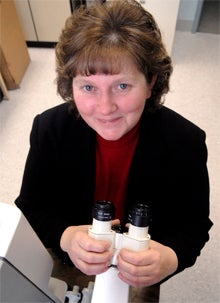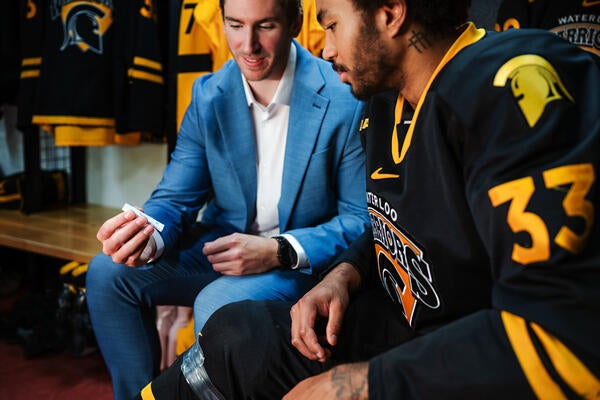
Revolutionary drug delivery
No more needles? Advances in nanotechnology could transform how we take our medicine.

No more needles? Advances in nanotechnology could transform how we take our medicine.
By Staff Communications & Public Affairs Marianna Foldvari is a translational science and commercialization powerhouse, with 16 patents and three spinoffs companies under her belt.
Marianna Foldvari is a translational science and commercialization powerhouse, with 16 patents and three spinoffs companies under her belt.
She’s also a professor at Waterloo’s School of Pharmacy and holder of a Canada Research Chair in Bionanotechnology and Nanomedicine.
As part of her research, Foldvari is developing non-invasive methods of drug and gene delivery, replacing needles with creams, sprays, drops, and patches.
These technologies will revolutionize how certain drugs can be administered to the body and provide treatment benefits not achievable before, such as the development of a self-administered topical cream for the prevention of cervical cancer caused by the human papillomavirus (HPV).
Foldvari sees great advantages to researchers in Waterloo’s intellectual property policy, Policy 73. The policy entrenches the right of creators to their invention and their freedom to do what they want with it.
In Canada, about a third of universities have a similar policy, but Waterloo is the only one that doesn't require revenue sharing. In the United States, it's unheard of — the Bayh-Dole Act mandates that universities retain ownership rights to patents resulting from federally funded research.
At institutions with university IP ownership policies, researchers who want to develop a product based on their own invention "may get very frustrated," Foldvari says. "They experience limitations to proceed on their own, yet the university doesn't have the resources to find partners or for active marketing of the technologies."
Foldvari views commercialization as a duty, not a privilege. "I had very good mentors — I learned early on that you must publish papers, but that's not where you should stop. You have to put your research findings in practice so that you may offer better treatment options for patients.”
"I came here because I saw the university as a visionary in developing nanotechnology. It feels like Waterloo is going off to the forefront of the world to make a difference."

Read more
New medical device removes the guesswork from concussion screening in contact sports using only saliva

Read more
New platform helps pharmacists prescribe with confidence, streamline administrative tasks and improve patient outcomes

Read more
Here are the people and events behind some of this year’s most compelling Waterloo stories
The University of Waterloo acknowledges that much of our work takes place on the traditional territory of the Neutral, Anishinaabeg, and Haudenosaunee peoples. Our main campus is situated on the Haldimand Tract, the land granted to the Six Nations that includes six miles on each side of the Grand River. Our active work toward reconciliation takes place across our campuses through research, learning, teaching, and community building, and is co-ordinated within the Office of Indigenous Relations.